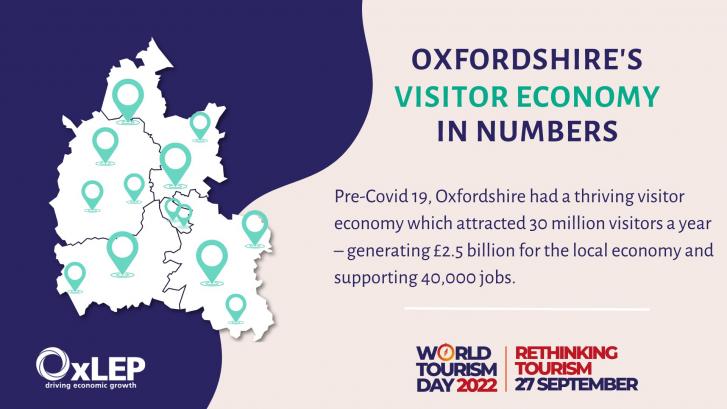
The visitor economy is a key contributor to economies worldwide, with one in ten individuals globally employed within the sector. It is also one of the most resilient, with a strong rebound rate in international tourism seen in the first five months of 2022, with almost 250 million international arrivals recorded – meaning that the sector has recovered almost half (46%) of pre-pandemic 2019 levels (United Nations data).
Today (Tuesday 27 September) sees the United Nations’ World Tourism Organisation (UNWTO’s) World Tourism Day take place across the globe, with this year’s theme focusing on ‘Rethinking Tourism’, in light of the recognition of the sector as one of the key pillars to development within an economy and despite the challenges visitor economies globally continue to face.
The theme also offers consideration as to how we prioritise tourism as a key sector, whilst ensuring this is done as safely and sustainably as possible – whilst also ensuring as swift a response in terms of recovery continues.
In line with such consideration – and much closer to home – sits Oxfordshire’s new Visitor Economy Renaissance Programme, supported through funding secured by OxLEP via the government’s Contain Outbreak Management Fund. The new programme aims to back the sector’s ongoing re-emergence from Covid-19 through a variety of positive interventions allowing the strengthening of the sector post-pandemic, as well as maintaining and retaining consumer confidence for the industry.
A key aim of the programme is to ‘attract visitors and ensure that Oxford and Oxfordshire maintain its position as one of the UK’s most desirable visitor destinations for local, national, and international visitors, with a focus on attracting value from all visitors and encouraging green and sustainable tourism and practices’. This is also whilst being mindful to continue to reduce the risk of Covid-19 transmission linked to the visitor economy, through measures to enable residents and visitors to be and to feel safe.
This new £1.64 million programme of activity aims to restore Oxfordshire’s visitor economy to its pre-pandemic glory, which attracted 30 million visitors a year to the county, generating £2.5 billion for the local economy and supporting 40,000 jobs. The programme also links directly to the Oxfordshire COVID-19 Economic Recovery Plan (ERP), which is the county’s comprehensive and co-ordinated whole system economic route map response to the pandemic – playing a key role in rebuilding market share and confidence of Oxfordshire as a Covid-safe destination.
Earlier this month, Oxford was announced as Forbes Advisor’s best ‘staycation’ destination for Autumn based on the cost of eating out, the price of an Airbnb and transport costs – along with the number of attractions for people to see this season, with Christ Church Meadow and the Oxford University Museum of Natural History amongst the areas proving popular within the rankings.
The city also has a great deal to offer as a ‘staycation’ destination due to its night-time economy offer, with a night in the ‘City of Dreaming Spires’ offering a series of exceptional theatres, arts venues and restaurants. One of the UK’s best counties for arts and culture, Oxfordshire is host to world-renowned museums, libraries and World Heritage Sites, running festivals and events that celebrate the arts throughout the year.
Destination Management Organisations (DMOs) for the county Experience Oxfordshire and Cotswolds Tourism play a vital role in showcasing all that Oxfordshire has to offer and just last week we announced the awarding of contracts for a series of strategic marketing campaigns in line with the Visitor Economy Renaissance Programme to the DMOs, to help leverage all the county has to offer and continue to attract visitors back to the county.
A key ambition of the Visitor Economy Renaissance Programme in supporting Oxfordshire’s visitor economy is increasing length of visitor stay and GVA through the sector through a number of positive interventions, including said strategic marketing campaigns, a virtual conference desk and the development of a Visitor Economy Vision and Action Plan.
The programme also aims to support the sector through the new Visitor Economy Grant Scheme – run by OxLEP Business - providing funds to eligible businesses, with grants ranging from £5,000 to £24,999 per business. Set to open for applications next month, next week the OxLEP Business team are set to hold a launch webinar to introduce the scheme and help businesses understand if they might be eligible for grant support. Register here.
Whilst home to iconic landmarks such as Blenheim Palace and the University of Oxford, Oxfordshire is also home to host of smaller rural visitor economy businesses, highlighting the beauty of a county which has so much countryside on offer. A core ambition of the Visitor Economy Renaissance Scheme is raising the profile of these areas and bringing visitors – and locals – out to explore these areas of outstanding beauty, particularly in light of some of the devastating effects the pandemic has had on smaller rural businesses.
This comes as earlier this month the Department for Environment, Food and Rural Affairs (DEFRA) launched the Rural England Prosperity Fund (Rural Fund), a top up to the UK Shared Prosperity Fund - worth up to £110 million for 2023/24 and 2024/25. The fund aims to create investment opportunities for eligible rural areas, helping to improve productivity and strengthen the rural economy and rural communities.
As World Tourism Day is celebrated as a crucial pillar in development around the world as we ‘Rethink Tourism’, Oxfordshire is in a prime position to leverage its visitor economy strengths and we believe – with the support on offer – become a key global destination of choice once again.
For things to do in Oxfordshire this World Tourism Day, go to www.experienceoxfordshire.org and www.cotswolds.com or follow @ExperienceOx and @CotwoldsInfo on Twitter.
Find out more about the Visitor Economy Renaissance Programme




